
Just like how American animated programs such as “The Simpsons” have popularized catchphrases to common households whether it would be “eat my shorts” or “do’h,” Japanese animation has its great share as well. So for today’s list, I will break down some of anime’s most famous one-liners and/or catchphrases. This list will explore some famous quotes from the original Japanese and the respective English dubs.
10. Black Lagoon
“This is more entertaining than Hollywood is ever gonna be!” - Revy
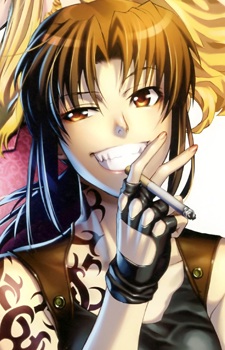 ' anime='
' anime='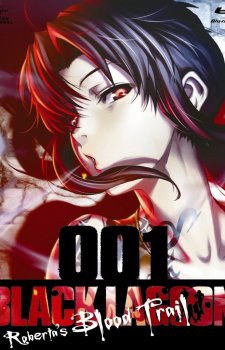 ']
']
Try to imagine yourself as Rock, formerly known as Okajima Rokuro. You work a 9 to 5 job (ok, but by Japanese standards let's say a 5am to 9pm job), your boss sucks, and your life is going nowhere. Then all of a sudden, you're kidnapped by pirates and end up suffering from a unique form of Stockholm syndrome. After going through shoot out after shoot out to a car chase, what's the next thing to do? Live Eric Cartman’s dream of being a pirate! When Revy responds to his question if he's in Hollywood, this one-liner practically became the strange answer to all of his problems. The way that Maryke Hendrikse casually delivers this line after a crazy gun chase shows either she’s telling the truth, or that Levy is a good actress. Either way, she’s offering Rock the chance of a lifetime. It also gives a more funny revelation to her nature as someone who is hotheaded and embraces it. The dub has been praised by fans and by the original studio itself.
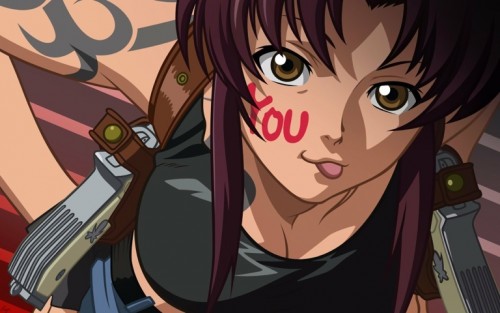
9. Prince of Tennis
“まだまだだね (Mada Mada Da Ne)” - Echizen Ryoma
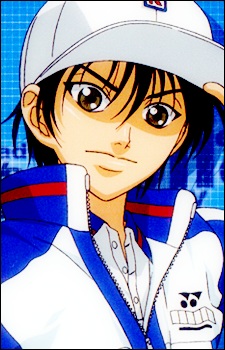 ' anime='
' anime='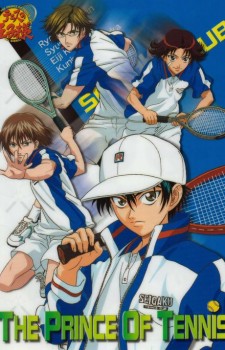 ']
']
You know the old saying “it’s not what you say, but how you say it?” Ryoma’s favorite line that he uses in almost every episode of “Prince of Tennis” is a Japanese phrase that embodies that. The original Japanese version has translated it as “You still have lots more to work on” in one episode, while the licensed version by VIZ translates it as “You still have a ways to go.” As stated before, this is just one of those Japanese phrases that only has meaning behind the context of how its used. It just means something hasn’t started or finished in just about any situation. It’s Ryoma’s way of trash talking meaning he is about to kick some ass after being on the losing end, or whenever he is holding back his abilities just to mess around. The great thing about this quote is that this is used in everyday Japanese. Take for example, you’re a boss at a company and someone gives you incomplete reports, you can just say “mada mada dane” to convey they are incomplete. Though it can be universally translated as “not yet,” not every situation can fit that translation and Ryoma’s use does not fit that. Heck, some Japanese girls sometimes find it cute if you say you learned this phrase from “Prince of Tennis.” However, it is actually very offensive in real life to use these words in a significant number of instances.
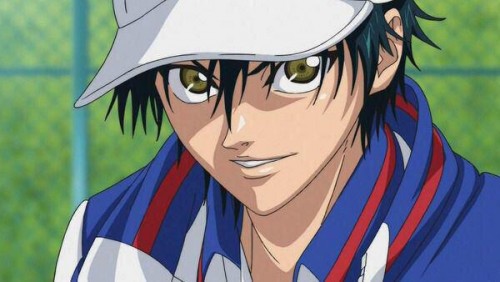
8. Neon Genesis Evangelion
“What’s wrong with running away from reality if it sucks!?” - Ikari Shinji
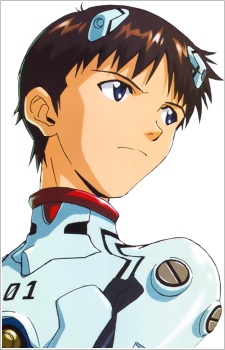 ' anime='
' anime='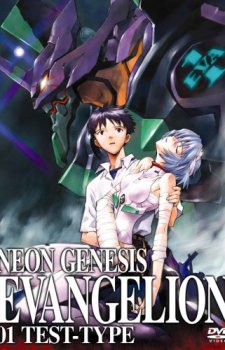 ']
']
While on a train ride with Rei, Rei tries to convey the truth with what Shinji is trying to deal with, and his reply is “What’s wrong with running away from reality if it sucks!?” In real life, the truth in any situation can be ugly for just about anyone. In Shinji’s own way in the dub, he does admit to having problems, and Rei is just trying to help him. In regards to the many psychological interpretations of “Evangelion” through traditional Freudian definitions in the view of western fans, after living in Japanese society and seeing how they treat mental illnesses such as depression, I think of this phrase and “Evangelion” as a whole as a metaphor on how Japanese society treats such people, which can be in itself, it’s own article.
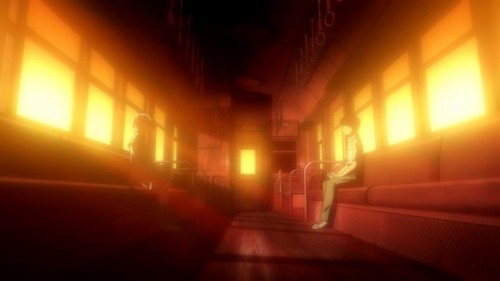
7. Naruto
“だってばよ (Dattebayo)/ Believe It!” - Uzumaki Naruto
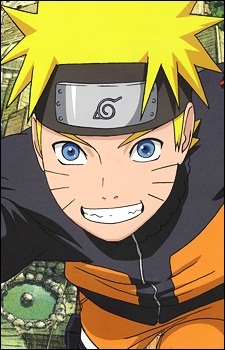 ' anime='
' anime='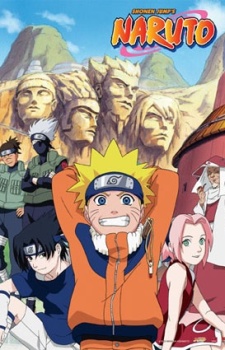 ']
']
If any one-liner defines the very essence of Uzumaki Naruto, it is certainly this one. In the original Japanese version, he likes to end his sentences in (dat) ttebayo instead of the standard “desu yo” or “da yo.” Unlike Himur Kenshin’s old school Japanese speech patterns ending in “gozaru,” (which was somewhat considered old school by the 1880s in Japan) there is really no direct translation to how Naruto ends his sentences. Kishimoto-sensei just wanted to make the character speak in a very unique way and that is what happened. The truth is, “dattebayo” is not even used in everyday Japanese and doesn’t technically exist. It was later revealed in the manga that he inherited this speech pattern from his mother, who tended to use the ending particle “ne,” while his son Boruto ends it in “sa.” This way of speaking makes Naruto’s speeches stronger, dramatic, and comedic all at the same time. If any of you readers converse with a Japanese style using Naruto’s speech pattern, a certain number of native Japanese speakers will instantly understand the reference. Since there is really no true English translation to “dattebayo,” the English version tends to create a whole new phrase, “believe it!” The phrase works in its own unique way because it is still a good representation to the spirit of Naruto’s character who is very goal oriented and will never let any obstacle stop him.
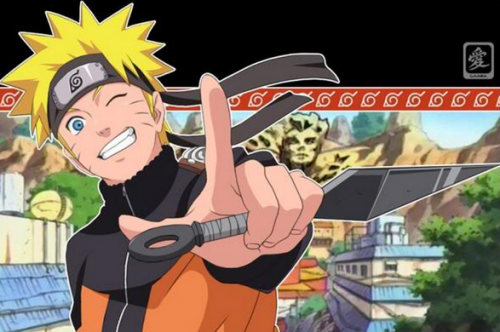
6. Hokuto no Ken
“お前はもう死んでいる (Omae wa mou shindeiru/You’re already dead)” - Kenshiro
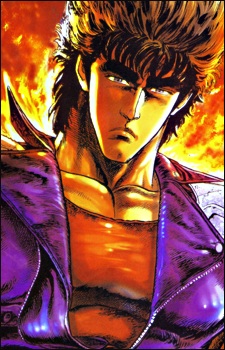 ' anime='
' anime='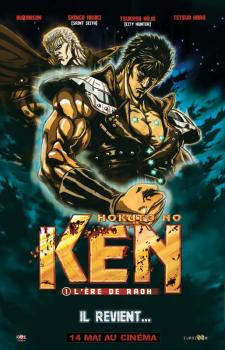 ']
']
Probably one of Japan’s most famous lines is “Omae wa mou shindeiru,” or “You’re already dead” by Kenshiro from “Hokuto no Ken.” Kenshiro is the master of Hokuto Shinken, one of the world’s deadliest fighting styles. It relies on pressure point attacks and it makes the opponent explode within a matter of seconds. In many episodes, Kenshiro will always use his Hokuto Hyakuretsu Ken, or a technique that he uses 100 punches. Whenever his opponent is about to strike back, he just stands there telling them “Omae wa mou shindeiru” only to have them explode just shortly after. Despite the character being passed onto other voice actors like Koyasu Takehito and Japanese movie star Abe Hiroshi in recent years, they could not do Kenshiro like his original seiyuu, the legendary Kamiya Akira. Having a great mix of comedy and action roles (such as Mendo from “Urusei Yatsura” and Saeba Ryo from “City Hunter”), Kenshiro is probably his best performance and the way he delivers this famous phrase in an apathetic manner appropriately brings out his badass qualities.
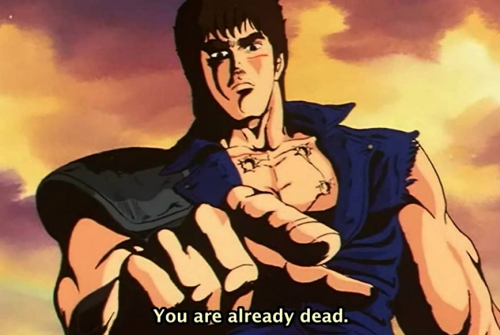
[ad_middle]
5. Dragon Ball Z
かーめーはーめーは (KAMEHAMEHA) - Son Goku, Son Gohan, Kuririn, Grandpa Gohan, Master Roshi, Cell
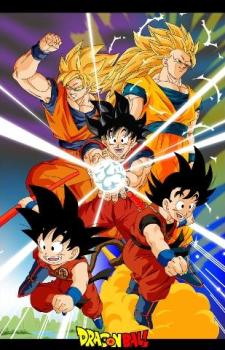 ' anime='
' anime='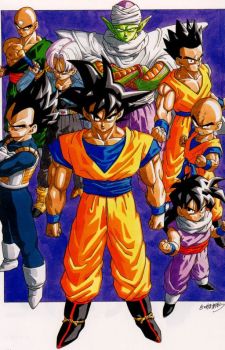 ']
']
Before the Hadouken in “Street Fighter II,” there was the Kamehameha from “Dragon Ball” first used by Master Roshi and later expanded to the main cast in which its power expanded to epic proportions. While thinking of a name to go with its pose, Akira Toriyama’s wife suggested the name of the first King of Hawaii, Kamehameha (though the Hawaiian pronunciation is different from the Japanese syllable system). Him and his wife thought the way the name sounded just simply went with the ridiculousness of Master Roshi’s character. Both the Japanese and English versions do a great job of making a ridiculous sounding technique more badass. Just not too long ago, a large number of Japanese schoolgirls took pictures of themselves acting out scenes from “Dragon Ball Z,” most notably the Kamehameha pose, and posted them throughout the Internet. Having worked at a girl’s high school in Japan, I had a chance to see such crazy antics.
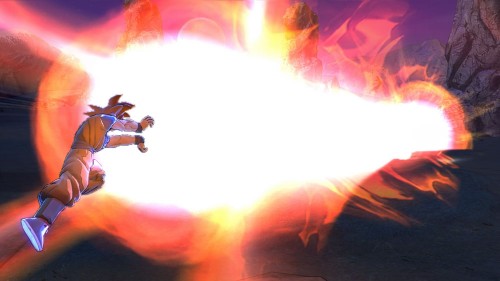
4. Death Note
You can call me what you like, but I will be taking your cake. - L Lawliet
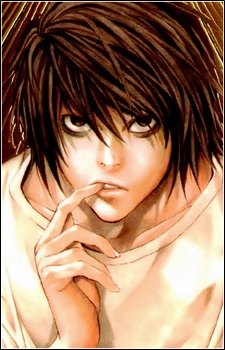 ' anime='
' anime='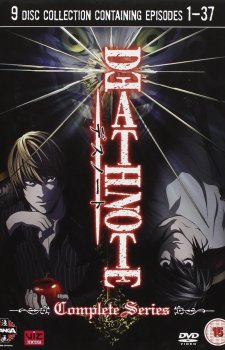 ']
']
With Light handcuffed to L, Light is attempting to have a normal date with popular idol, Amane Misa. While at an office, Misa refuses cake with the usual feminine excuse that it makes you fat. L comes back with the gesture that if one uses their brainpower, they can still burn the calories and one thing leads to another with this argument with his surveillance activities. Feeling violated of her privacy, Misa calls L a pervert and he brushes off the accusation without a care as long as he has his cake that no one will seem to eat. The scene is a perfect example of L’s composure and dedication to his mission, and he still gets his cake because that’s what he does best. Alessandro Juliani’s (who not only does voice work for anime, but has appeared on “Stargate SG-1” and was also in “Man of Steel” as a military scientist) performance in the English version truly captures these qualities of him, while Yamaguchi Kappei’s (most famous as Ranma and Inuyasha), tends to make the childish side of him stand out more.
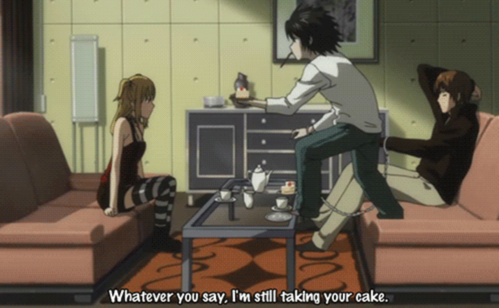
3. Fullmetal Alchemist
“食べてもいいよね?(Tabetemo ii yo ne?) Can I eat him? “ - Gluttony
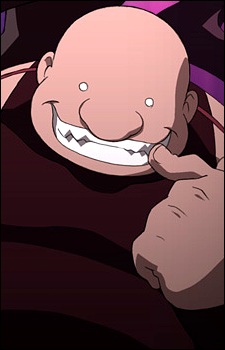 ' anime='
' anime=' ']
']
Living up to his namesake, Gluttony just loves to eat and that is not just limited to food, but the people he fights. Due to his lower mental capacity in comparison to the other league of homunculi, Gluttony is always the muscle to another. With his mobility despite his size, he is as capable fighter. Before he faces an opponent, he always asks his accompanying boss if he can eat him or her. Both the Japanese and English versions delivery it in a way that makes him sound creepy like he’s some child molester and it perfectly reflects the expressions he makes. Every time he asks to eat someone, you just want to cower in fear.
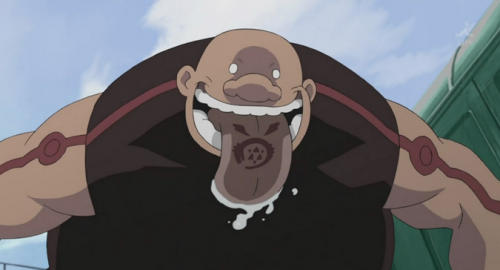
2. JoJo’s Bizarre Adventure
“このディオだッ! (KONO DIO DAA! IT WAS ME, DIO!)” - Dio Brando
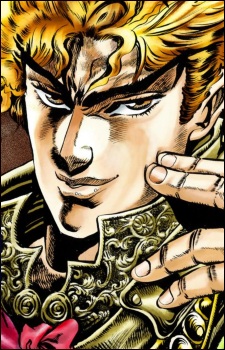 ' anime='
' anime='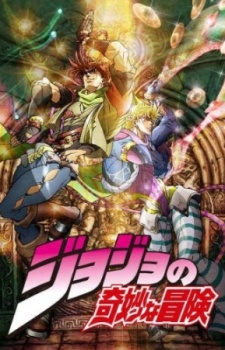 ']
']
“JoJo,” in its various story arcs, all contain countless catch phrases you can buy on pins, coffee mugs, and t-shirts at a Jump store in Japan. Though, Dio has his share of scheming catch phrases and battle cries such as “WRY” and “ZA WARUDO” (it just feels more “natural” and “exotic” in Japanese style English compared to just simply, “the world” in natural English) that were made iconic through Chiba Isshin’s portrayal in the old school Capcom fighting game. If there is a new Dio quote that is popular, it’s “KONO DIO DA!!!” Or officially translated as “IT WAS ME, DIO!!” In the beginning of the first story arc, Dio is still a pre-teen living in Victorian England and wants to ruin the life of Jonathan Joestar. He goes as far as stealing the first kiss of Erina, a woman that Jonathan is trying to court. Seeing this, is the truth why Dio brags about it with this line. What makes it so awesome is Koyasu Takehito’s over the top delivery. Granted, the way he screams “ZA WARUDO” may not be as awesome as Chiba Isshin’s, but Koyasu’s performance along with how the evil expression on his face is framed brings a new life to a line which was published in the original manga nearly thirty years ago. Last, the dramatic background music and the sound effect to Erina’s action with what I call the “shock spark” coming out of her head just adds more flavor to it.
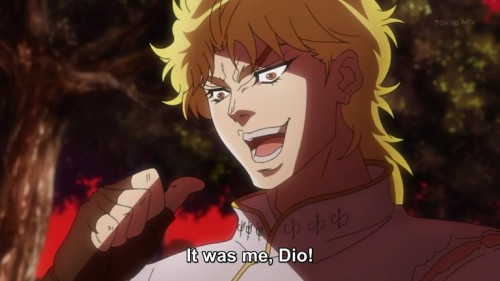
1. Slam Dunk
“俺は天才だ!(Ore wa tensai da! I’m a basketball genius!)” - Sakuragi Hanamichi
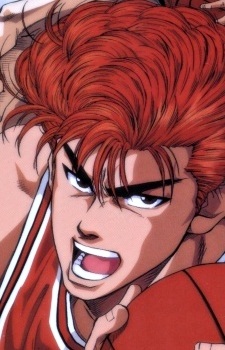 ' anime='
' anime='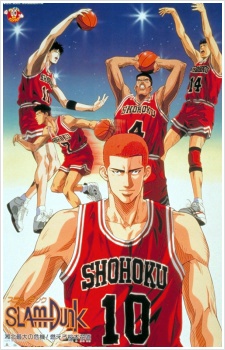 ']
']
If there is one reason that inspired us to make this list, it was this quote from the hit series, “Slam Dunk.” Just by seeing the numerous t-shirts in Tokyo and Yokohama, it just had to be number one. This constant one-liner by Sakuragi is the perfect definition of his character –that he's full of himself and all the confidence in the world. This line is wonderfully brought to life by Kusao Takeshi, who hardcore “Dragon Ball Z” fans are likely to know as the voice of Trunks. If fans of “DBZ” watched it in the original Japanese and have an ear for certain seiyuus, his voice is rather recognizable and he tends to have a very rough and comedic approach in his role to Sakuragi. What motivates him to constantly boast the fact that he's a genius is because of Haruko, a girl he has a crush on. Due to Haruko openly praising Sakuragi having the potential to be a great basketball player because of his natural physical attributes, Sakuragi opens his heart to the sport despite starting out not knowing the difference between dribbling a ball in basketball and soccer. With a combination of his genetics and the hard work he puts in to knowing the basics, there will be moments when his claim of being a genius will be serious, and not in a comedic delivery whenever he bickers with his romantic rival, Rukawa.
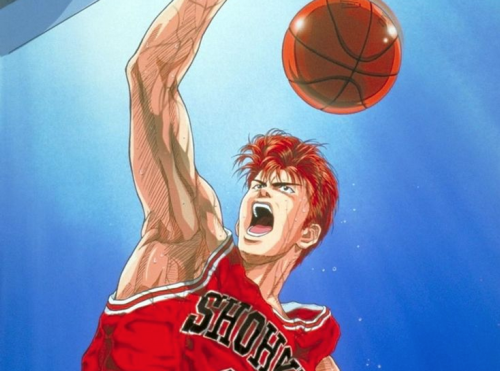
With all the anime out there, I am sure many readers have their own favorites. Please feel free to share them in the comment box below! Some work in their original Japanese, and some work or find a distinct new kind of life in the English versions. If you watch anime in any other languages, are there any other famous phrases or one-liners out there that are popular to that language? Please let everybody know!